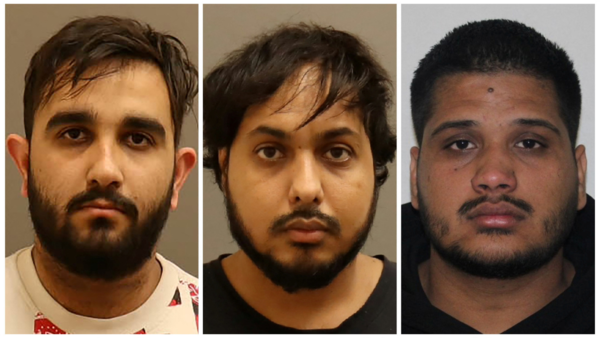Jaishankar’s comments came after Canadian police said they were investigating possible links to India after three Indian nationals were arrested in connection with the killing of pro-Khalistan separatist Hardeep Singh. Nijardesignated as a terrorist by India.
The foreign minister told a press conference in Bhubaneswar that Canada “allows organized crime, especially from Punjab”.

A suspect in the murder of Sikh separatist leader Hardeep Singh Nijjar in Canada. (Reuters)
“I just saw three people arrested before I came in. They were obviously Indians with some kind of gang background. We will wait for the police to tell us more. But usually, if you don’t have a political agenda, if I say I doubt you , I will present evidence,” he said at a news conference. “Canada has never given us anything involving the Indian government. In fact, we have told you (the Canadian government) many times that if you have anything, please give it to us,” Jaishankar added.
The report by Canadian Commissioner Marie-Josée Hogue cited the involvement of Indian officials, including agents in Canada, in influencing Canadian communities and politicians. Their goal was to “align Canada’s position with India’s interests on key issues, particularly how the Indian government views Canadian supporters of an independent Sikh homeland,” the report said. The report was made public by Canada’s World Sikh Organization (WSO), a hardline group that advocates the establishment of an independent state of Khalistan.
Jaishankar blamed Canada’s problems on “vote bank” politics, saying the situation was made worse by the fact that the ruling party does not have a majority.The party they depend on is Support Khalistanihe said, adding that India has been urging Canada not to provide space to separatists and not give them political legitimacy as this would create problems for both India and Canada and their relations.
“I have 25 cases around me where they are either known to be pro-Calistani or part of a criminal group. We made extradition requests to them but they did nothing. There is a gang war going on there. . They blamed India every time. But the investigative agencies there never gave any evidence. My feeling is that this is a political game,” he said.
Jaishankar also refuted former Pakistan Prime Minister Imran Khan’s allegations in a column in a British daily that India was carrying out killings in Pakistan. The foreign minister said Pakistan had no shortage of terrorists who committed such crimes. Khan claimed that “India has admitted to carrying out assassinations inside Pakistan and the international border with Afghanistan remains unstable…”
Responding to Khan’s article, Jaishankar said: “Now, from what we’re seeing, there are reports that some people with a terrorism background, some of them died in very unusual circumstances. That’s something they need to look into. matter.
“Terrorists are not good people. They may do things to each other. I don’t fully understand Khan’s article. But I do know that instead of asking why these people are dying, I would start by asking why there are so many terrorists in Pakistan. Why is Pakistan so Protect them? This is the question that should be answered,” Jaishankar said.
Meanwhile, the Canadian report said, “India does not distinguish between legitimate, pro-Khalistan political advocates and the relatively small Canadian Khalistan violent extremist community… Targets of India’s foreign interference are often members of the Indo-Canadian community, But prominent non-Indian Canadians have also been affected by India’s foreign influence activities,” the report said.
Regarding alleged interference in the 2019 and 2021 elections, it claimed: “Substantial intelligence indicates that Indian proxies may seek to interfere with the democratic process, reportedly by covertly providing illegal financial support to various Canadian politicians” in an attempt to ensure pro-India support. Candidates for election or influence over candidates for office.
In another section titled “Alleged foreign interference by the Indian government,” it mentioned that during Canada’s federal elections, Indian officials were observed “showing interest in personal campaigning” and may have wanted “pro-India candidates to win.”







